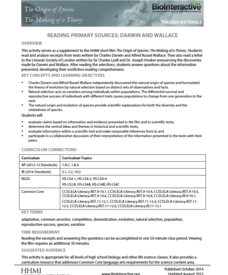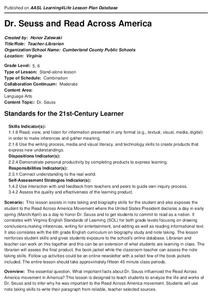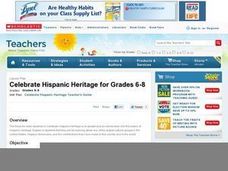K5 Learning
The Fox and the Little Red Hen
Read about the fox family that decides to cook a hen for dinner. After reading, individuals answer questions about the elements of plot in the story. They require drawing conclusions, making predictions, and describing specific parts in...
Curated OER
The Sinking of the Titanic
Investigate the sinking of the Titanic with young scholars. They will read actual documentation from the Titanic and answer questions. They will then draw conclusions from the pictures they see and information they read.
Polk Bros Foundation
I Can Identify/Infer Motive
Why do people and characters act as they do? Require your class figure out the motivation of two people or characters they read about in a given text. In the short charts, pupils note down who, what they do, and why they do it. After...
CPALMS
Analyzing Vonnegut's View of the Future and His Commentary on the Present in Harrison Bergeron
Kurt Vonnegut's short story "Harrison Bergeron" engages adolescents with its theme about the dangers of complete societal equality. Learners complete a graphic organizer to track literary elements in the story, as well as an inference...
K20 LEARN
The Sirens: Is It a Bird or Is It a Fish?
Fish, fowl, foul fish, or foul fowl? Just what is a siren? Young scholars listen to a video clip and draw what they imagine when they hear the word "siren." After watching several videos depicting sirens, class members read "The Sirens'...
Curated OER
Mucket Mania: The Mussel Industry in Arkansas
Middle and high schoolers read and discuss articles about the mussel industry in Arkansas. They pay close attention to the history of pearling and button making industries on the Black and White Rivers of Arkansas. This impressive,...
Curated OER
Family Life in the 1830s
Students compare and contrast family life today with family life in the 1830s. They conduct research on Old Sturbridge Village, read primary source documents, and develop a list of generalizations comparing/contrasting families of the...
Curated OER
Arthur's Reading Race: comprehension skills
In this comprehension skills worksheet, students read the book Arthur's Reading Race and complete comprehension activities. Students complete 5 activities including story elements, making inferences, predicting, and drawing conclusions.
Read Works
How to Say “I Ruff You”
Who says you need a human to be your valentine on Valentine's Day? Give your dog-loving readers an inspiring perspective on how a sister givdes her brother a valentine from the family dog. They then answer 10 questions thatd involve...
Central Bucks School District
Making Generalizations
Being able to recognize patterns, craft generalizations, and draw conclusions based on information in a text passage are essential critical thinking skills. Encourage learners to hone these skills with a instructional activity that asks...
Howard Hughes Medical Institute
Reading Primary Sources: Darwin and Wallace
Take your classes back in time. Learners read real historical texts from both Darwin and Wallace as well as an announcement of their findings. Using guiding questions, they make inferences and draw conclusions from the information in the...
Redefining Progress
Have and Have-Not
Is there a correlation between a country's wealth and the extent of its ecological footprint? What exactly constitutes an ecological footprint, and how does one country stack up against the rest? This is a unique instructional activity...
Curated OER
Size It Up: Map Skills
Compare information from a US population cartogram and a standard US map. Learners draw conclusions about population density by analyzing census data a population distribution. They discover that census data is used to apportion seats in...
Live Oak Media
Activity Guide: Joseph Had a Little Overcoat
Enhance a reading of the Caldecott Medal-winning children's book Joseph had a Little Overcoat by Simms Taback with this collection of learning activities. Starting with general background information about the book and author, this...
Curated OER
Big Bushy Mustache: comprehension skills
In this comprehension skills worksheet, students read the book Big Bushy Mustache and complete comprehension activities. Students complete 5 activities including note taking, making inferences, fiction and non fiction, drawing...
DePaul University
Settlement
Early settlers in the American Midwest experienced constant struggle. This reading passage describes for young learners the hardships of homesteaders as they journeyed west and sought to start a new life. When finished, students identify...
EngageNY
Drawing a Conclusion from an Experiment (part 2)
Communicating results is just as important as getting results! Learners create a poster to highlight their findings in the experiment conducted in the previous lesson plan in a 30-part series. The resource provides specific criteria and...
Novelinks
Sense and Sensibility: Anticipation Guide Reading Strategy
Begin your discussion about Jane Austen's Sense and Sensibility before you even open the book. Kids fill in a worksheet that lists five statements about the literary themes of the novel, and then discuss their opinions as a group. Once...
Curated OER
Dr. Seuss and Read Across America
What important facts about Dr. Seuss influenced the Read Across America movement...? This is the driving question of a research project that requires scholars to find information about Dr. Seuss' life and work. Class members write a...
Science 4 Inquiry
The Ins and Outs of Photosynthesis
The most important chemical process on Earth is photosynthesis. Scholars explore the changes in the gases in our atmosphere as life on Earth developed. They create a model of photosynthesis and consider simple questions.
Science 4 Inquiry
An Investigative Look at Florida's Sinkholes
In May of 1981, the Winter Park Sinkhole in Florida first appeared and is now referred to as Lake Rose. Scholars learn about the causes of sinkholes through an inquiry project. Then, they analyze recent data and draw conclusions to...
Curated OER
What Do Maps Show?
This teaching packet is for grades five through eight, and it is organized around geographic themes: location, place, relationships, movement, and regions. There are four full lessons that are complete with posters, weblinks, and...
Curated OER
Celebrate Hispanic Heritage: Grades 6-8
To gain a better understanding of Hispanic heritage and culture, as well as to build informational comprehension skill, learners explore facets of Hispanic American History. They engage in a class discussion, research three facts, and...
Curated OER
China's Three Gorges Dam
A very well-done resource includes an informational reading passage describing the controversy and impact of China's Three Gorges Dam. It also includes eight guided reading questions, a pros/cons arguments chart, and a creative writing...

























